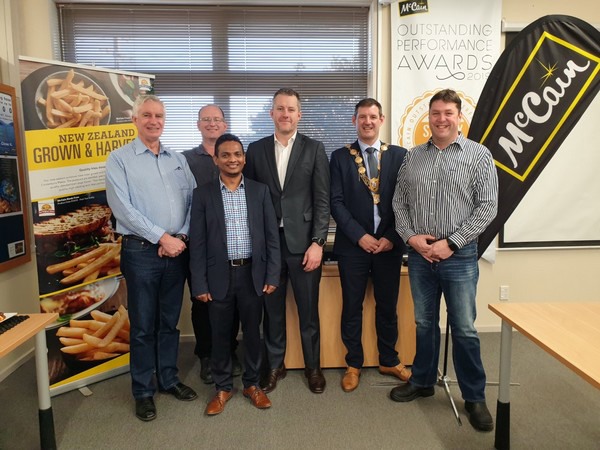McCain Foods’ Timaru plant is reducing its energy usage environmental impact, now looking to electrification, by installing New Zealand-first McCain proprietary technology.
The plant operates 24 hours, seven days a week to process potatoes into a range of consumer frozen chip products. Energy demand is significant, with one of the highest demands coming from pre-treatment of potatoes. Until recently, McCain used steam from the burning of coal in the pre-treatment process. The business has now slashed its coal consumption by installing technology which was developed and is owned by McCain, Pulsed Electric Field technology (PEF).
 John Jackson – Director McCain, Lenard Smythe – Project Manager
John Jackson – Director McCain, Lenard Smythe – Project Manager
Eddie Christian – EECA GM Investment and Engagement
Nigel Bowen - Timaru District Mayor, Barto Greeff – McCain Timaru Plant Manager
In front: Kanchana Marasinghe – EECA Senior Account Manager
Contributing to the business’s global commitment to a 50 per cent reduction in CO2 emissions of our plants by 2030, the PEF system means the company will not only save approximately 4,800 tonnes of carbon each year, but also around 52,000 gigajoules (GJ) of energy through increased efficiency and reduced wastage – equivalent to the electricity needed to power around 1,800 Kiwi houses for a year.
The electric field pulsed through uncut potatoes during processing results in less breakage when cutting, and therefore less waste. It significantly reduces energy and water consumption, and after PEF treatment, less oil is absorbed by produce upon deep-frying.
It is physically smaller than the old pre-heaters, also saving on space.
McCain is a participant in EECA’s Energy Transition Accelerator (ETA) programme, which empowers New Zealand’s largest energy users – those that generate more than 10,000 tonnes of carbon emissions per
annum - to take a leading role in New Zealand’s decarbonisation pathway.
The ETA programme provides a roadmap for organisations to decarbonise their operations and, where appropriate, can provide co-funding support. EECA provided $250,000 towards McCain’s PEF project, from its Technology Demonstration fund.
EECA Chief Executive Andrew Caseley said that one of the aims of the Technology Demonstration funding is to encourage uptake of underutilised energy efficient technology in New Zealand. “Although PEF technology has been installed by McCain in other of its food processing factories around the world, it is new in New Zealand. There is great potential for carbon reduction savings to be achieved across different processing industries through the use of technology.”
He adds, “Electrification is key to getting our biggest emitters off fossil fuels and leading the way into a low-carbon future, and we’re pleased to support McCain making this progress.”
McCain Foods New Zealand Senior Plant Manager Barto Greeff, based in Timaru, said that adapting McCain’s operations to mitigate its impact on climate change was pivotal to the company’s growth strategy and an essential building block to be best-in-class for sustainable practice. They aim to cease coal use by 2025.
